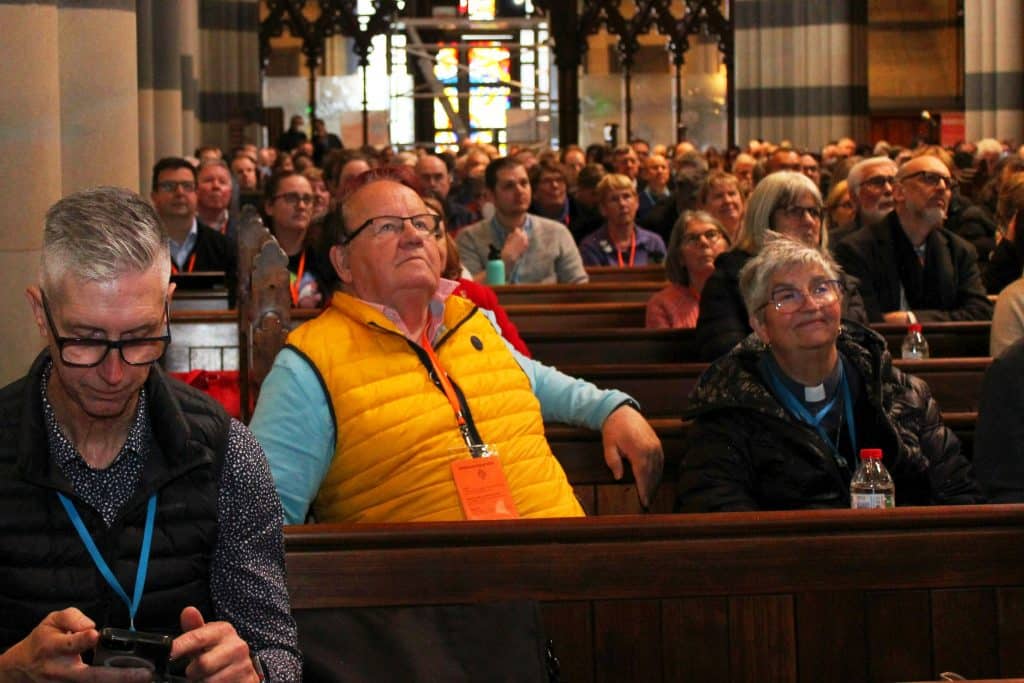
Jenan Taylor
14 September 2023
A case for Melbourne’s clergy hours to be standardised at five days a week could be considered by the diocese’s working conditions committee if a Clergy Working Hours Review motion passes at October’s synod.
Synod delegates will be asked to request the committee to include a review of the case for establishing a standard of a five-day working week for full-time clergy in its 2024 determination recommendation.
This was among the motions published on Wednesday in papers for the 2023 Melbourne Synod.
Another motion calls on the synod to affirm that it remains in full communion of the Archbishop of Canterbury and supports him, and the other instruments of the Anglican Communion.
The provision of the diocese’s professional standards service, hospital chaplaincy, and children’s and young people’s ministries are also set to be debated at the 54th synod next month.
Clergy Working Hours
Synod will be asked to request the Clergy Remunerations and Working Conditions Committee review the case for establishing a five-day working week for full time clergy, as part of its 2024 determination process.
The motion calls for this as part of a review of the working hours of clergy and their leave arrangements.
Under the current determination full-time clergy work 48 hours across a six-day week.
Read more: Lay representation, Archbishop Election Act – 2022 Melbourne Synod wraps up
The motion references a desire to support appropriate working conditions for office holders and employees in Melbourne diocese churches.
It calls for the synod to affirm the biblical principle of Sabbath rest, and recognise the extent of clergy burnout in moving the motion.
The Reverend Andrew Bowles moved the motion, which was seconded by the Reverend Luke Whiteside.
Discussions about clergy professional development at the 2022 synod also raised the issue of burn-out, along with the elevated non-pastoral compliance and administrative loads on them.
Instruments of Communion
Delegates will also be asked to affirm the diocese remains in full communion of the Archbishop of Canterbury, and supports him and the other three Instruments of Communion: the Lambeth Conference, Primates’ Meeting, and the Anglican Consultative Council.
The Reverend Dr Fergus King moved this motion, and Bishop Alison Taylor seconded it.
In February, the Global South Fellowship of Anglican Churches rejected the Archbishop of Canterbury as head of the global church, and declared the Church of England was no longer the “mother church” of the Anglican Communion.
It came after the Church of England’s General Synod voted to allow clergy to bless couples in same-sex marriage.
Professional Standards
Synod will also be asked to change legislation to allow the Anglican Diocese of Melbourne to potentially appoint an alternative provider of professional standards services.
Currently Kooyoora Limited administers the Professional Standards Uniform Act 2016 for the diocese, and its Professional Standards Office handles complaints, screening and redress matters.
An explanatory memorandum in the agenda papers notes that this act locks the diocese into using Kooyoora as the provider.
Read more: Some synod questions ‘manifestly out of order’
The proposed bill would change the 2016 act, which the Melbourne diocese and Anglican Diocese of Bendigo have both adopted.
The 2021 Melbourne synod resolved that there be a common service provider between all the dioceses in the province of Victoria.
The 2021 resolution also affirmed the importance of the Melbourne diocese continually reviewing and improving safe ministry and professional standards matters, and tailoring arrangements to its specific needs.
Archbishop in Council requested in August 2022 that a bill be prepared to bring to synod 2023 to address issues arising from new child safe standards and recent professional standards board determinations, among other things.
The Reports to Synod papers describe this as part of several important developments relevant to professional standard matters in recent years.
Children’s and young people’s ministry
Synod is also set to consider legislation to create a steering committee for children’s and young people’s ministry, set out its functions, and employ staff to assist that committee.
A 2022 synod motion requested that appropriate legislation be prepared for a permanent authorised standing committee for children’s and youth ministry with legislation terms and draft legislation to be developed by the CYM steering committee.
Hospital Chaplaincy
A motion asks delegates to recognise the diocese’s financial challenges and regret its plan to cease funding hospital chaplaincy services, and endorse the importance of those services as a critical mission of the church.
Representatives are also asked to note that spiritual health care was a vital part of people’s care needs in health care settings and request Archbishop in Council to consider alternate healthcare chaplaincy and continuity of care models and alternative ways of funding them.
Read more: The Archbishop Election Bill – ‘cleaner, clearer, fairer’? Melbourne Synod Day 3
The diocese will cease funding the current model at the end of 2023.
The Reverend Dawn Treloar moved the motion, which was seconded by the Reverend Christopher Morris.
New congregations, refugees and asylum-seekers held in detention in Papua Guinea, and violence against Christian minorities in Manipur, India are also on the synod agenda.
The 54th Melbourne Synod is scheduled to take place from Wednesday 12 October to Saturday 14 October 2023.
For more faith news, follow The Melbourne Anglican on Facebook, Instagram, or subscribe to our weekly emails.






